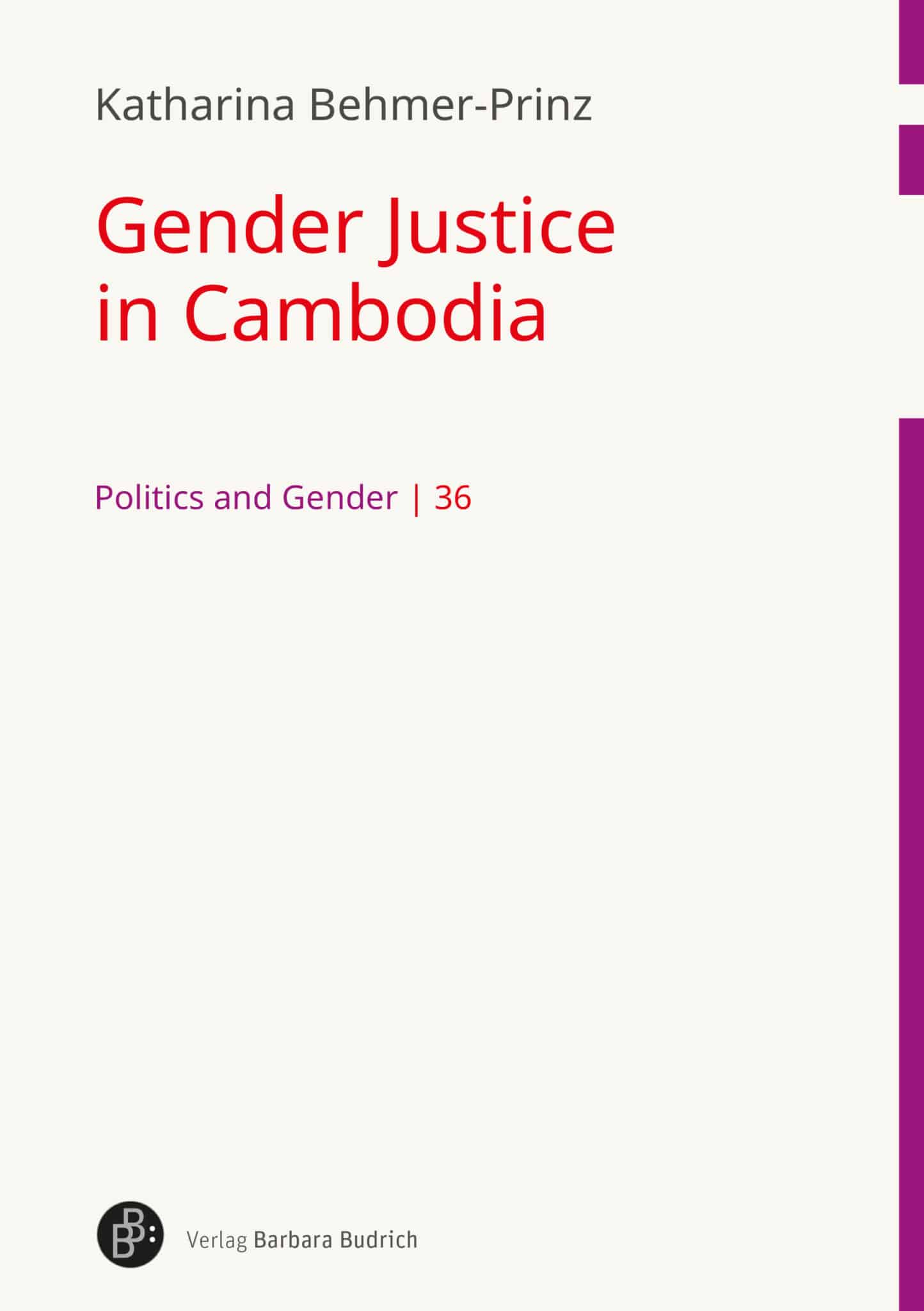Informationen zum Buch
Home » Publications » Gender Justice in Cambodia
Gender Justice in Cambodia
0,00 € - 59,90 €
Beschreibung
Post-conflict societies undergo significant transitions, often accompanied by international interventions (e.g. transitional justice). These interventions bring both international actors and norms into sovereign national spaces, triggering dynamic norm changes and negotiations. The book presents a theory-driven approach to understanding the complex interactions between local and global norms. It aims to make norm translation, localization, and change processes transparent. The case study illustrates how global gender norms were localized, leading to the prosecution of forced marriage at the Khmer Rouge tribunal in Cambodia. It also highlights how legal activism and transnational advocacy drive this localization process, introducing hybrid courts as norm catalysts. Finally, the book offers a nuanced understanding of norm negotiations in transnational justice politics.
This book discusses social norm change in the context of international cooperation on transitional justice. Using the case of forced marriage convictions at the Khmer Rouge Tribunal in Cambodia, it examines the transfer of international gender justice norms at the national level. The focus is on how the international concept of gender justice has been applied to Cambodia’s post-conflict process, in particular the nature and triggers of norm transfer and the role of the tribunal. Gender justice, which includes addressing gender-based violence, has long been overlooked in transitional justice, including in Cambodia. Under the Khmer Rouge regime (1975-1979), nearly 1.7 million Cambodians died and mass forced marriages were used to control social relations. Despite the establishment of a tribunal in 2003 to prosecute Khmer Rouge crimes, gender justice remains insufficiently addressed. This slow process contrasts with the global norm that peace and security policies must take gender dimensions into account. The research shows that the conviction for forced marriage represents the localisation of international norms of gender justice. Legal peculiarities in the functioning of the tribunal and ‚legal activism‘ played a crucial role. A transnational network of local activists and international criminal law experts pushed for forced marriage convictions using international standards. The tribunal’s victim participation and legal expertise in gender justice influenced the outcome. The research shows that the process, rather than the verdict itself, was key to gendering the post-conflict process. Forced marriage convictions brought gender-based crimes under the Khmer Rouge and their survivors, particularly women, into the public and collective narrative. This study highlights the role of post-conflict courts as catalysts for norm change and as powerful actors in international cooperation.
Die Autorin:
Dr. Katharina Behmer-Prinz, Ruhr University Bochum (RUB), Germany
The subject:
Political science
Zusätzliche Informationen
| Publisher | |
|---|---|
| ISBN | 978-3-8474-2741-4 |
| eISBN | 978-3-8474-1911-2 |
| Format | 14,8 x 21,0 cm |
| Scope | ca. 240 |
| Year of publication | 2025 |
| Date of publication | ca. 18.05.2026 |
| Edition | 1. |
| Language | Englisch |
| Series | |
| Volume | 36 |
Autor*innen
Beschreibung
Beschreibung
Post-conflict societies undergo significant transitions, often accompanied by international interventions (e.g. transitional justice). These interventions bring both international actors and norms into sovereign national spaces, triggering dynamic norm changes and negotiations. The book presents a theory-driven approach to understanding the complex interactions between local and global norms. It aims to make norm translation, localization, and change processes transparent. The case study illustrates how global gender norms were localized, leading to the prosecution of forced marriage at the Khmer Rouge tribunal in Cambodia. It also highlights how legal activism and transnational advocacy drive this localization process, introducing hybrid courts as norm catalysts. Finally, the book offers a nuanced understanding of norm negotiations in transnational justice politics.
This book discusses social norm change in the context of international cooperation on transitional justice. Using the case of forced marriage convictions at the Khmer Rouge Tribunal in Cambodia, it examines the transfer of international gender justice norms at the national level. The focus is on how the international concept of gender justice has been applied to Cambodia’s post-conflict process, in particular the nature and triggers of norm transfer and the role of the tribunal. Gender justice, which includes addressing gender-based violence, has long been overlooked in transitional justice, including in Cambodia. Under the Khmer Rouge regime (1975-1979), nearly 1.7 million Cambodians died and mass forced marriages were used to control social relations. Despite the establishment of a tribunal in 2003 to prosecute Khmer Rouge crimes, gender justice remains insufficiently addressed. This slow process contrasts with the global norm that peace and security policies must take gender dimensions into account. The research shows that the conviction for forced marriage represents the localisation of international norms of gender justice. Legal peculiarities in the functioning of the tribunal and ‚legal activism‘ played a crucial role. A transnational network of local activists and international criminal law experts pushed for forced marriage convictions using international standards. The tribunal’s victim participation and legal expertise in gender justice influenced the outcome. The research shows that the process, rather than the verdict itself, was key to gendering the post-conflict process. Forced marriage convictions brought gender-based crimes under the Khmer Rouge and their survivors, particularly women, into the public and collective narrative. This study highlights the role of post-conflict courts as catalysts for norm change and as powerful actors in international cooperation.
Die Autorin:
Dr. Katharina Behmer-Prinz, Ruhr University Bochum (RUB), Germany
The subject:
Political science
Bibliography
Zusätzliche Informationen
| Publisher | |
|---|---|
| ISBN | 978-3-8474-2741-4 |
| eISBN | 978-3-8474-1911-2 |
| Format | 14,8 x 21,0 cm |
| Scope | ca. 240 |
| Year of publication | 2025 |
| Date of publication | ca. 18.05.2026 |
| Edition | 1. |
| Language | Englisch |
| Series | |
| Volume | 36 |
Produktsicherheit
Bewertungen (0)
Bewertungen
Es gibt noch keine Bewertungen.





Bewertungen
Es gibt noch keine Bewertungen.